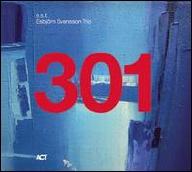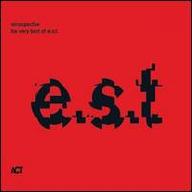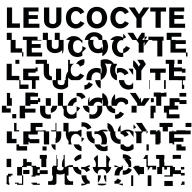Svensson was born in Västeras, Sweden, on April 16, 1964 -- his mother was a classical pianist and his father a die-hard jazz buff, but in spite of his classical training he first gravitated toward pop, playing in a series of amateur rock & roll bands alongside high-school classmate and drummer Magnus Öström. After studying music at Stockholm's Kungliga Musikhögskolan, Svensson worked as a session player, and in 1985 formed a bop-inspired duo with drummer Fredrik Norén. In 1993, he reconnected with Öström, and together with bassist Dan Berglund they formed the Esbjörn Svensson Trio, which would become universally known by the acronym E.S.T. Although the group's debut LP, When Everyone Has Gone, earned scant attention, the trio quickly emerged as a fixture of the Swedish festival circuit in addition to backing singers including Viktoria Tolstoy and Louise Hoffsten -- while Svensson's piano balanced the structural complexity of his classical background with the improvisational daring of postwar influences like Bill Evans and Keith Jarrett, Öström's powerhouse drumming channeled more mainstream influences like rock and funk, and in time E.S.T. earned a fan following that extended far beyond the confines of the conventional jazz cognoscenti.
With 1996's Esbjörn Svensson Trio Plays Monk, critics roundly applauded Svensson's fearless interpretive sensibilities. A year later, the intimate Winter in Venice earned the trio the Swedish Grammy for Best Jazz Album, and for 1999's From Gagarin's Point of View the band signed an international licensing deal with German label ACT, for the first time winning significant notice outside of Scandinavia. By the 2002 release of Strange Place for Snow, E.S.T. were firmly established as Europe's most popular jazz group, regularly headlining large concert halls across the continent. They also played dozens of pop music festivals, incorporating film projections, lighting, and set design into their stage act to further shatter genre preconceptions. In conjunction with the 2003 LP Seven Days of Falling, E.S.T. won the International Artist Award at the BBC Jazz Awards and, following the 2006 release of Tuesday Wonderland, the trio was the first European act ever to adorn the cover of the venerable American jazz magazine Down Beat.
In early 2008, E.S.T. reconvened in the studio to record Leucocyte, a project integrating electronic and processed sounds within the jazz trio format. After completing the album, Svensson went scuba diving off the coast of the Swedish island community Ingarö; his companions found him lying unconscious on the seabed and although his body was rushed by helicopter to Karolinska University Hospital, attempts at resuscitation proved unsuccessful. Svensson was just 44 years old. Leucocyte was re-released in September and topped jazz charts all over Europe.
Four years later, sound engineer Åke Linton, with Berglund and Öström, released the completed extant tracks as 301 (titled for the studio in Sydney, Australia, where they recorded both sets. Upon its release, many jazz critics celebrated the album as E.S.T.'s best work. In 2018, ACT issued E.S.T. Live in London, and followed it the next year with E.S.T. Live in Gothenburg.
Just a few weeks before Svensson's death, his wife Eva heard him recording solo piano pieces in their home studio. As was her custom, she backed up his digital files. After his passing, they sat in the vault for 13 years. When she revisited the music, she recruited Linton to assist with mastering. (Svensson had already mixed them). She kept the chronological order of the music the same and, since there were no titles, named them after letters in the Greek alphabet, which Svensson loved and knew by heart. The nine-track album was released by ACT as HOME.S. in November 2022. ~ Jason Ankeny, Rovi


















